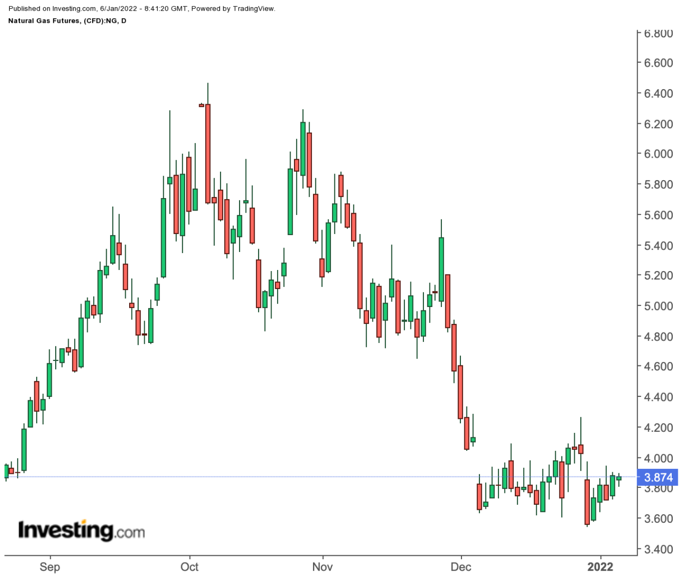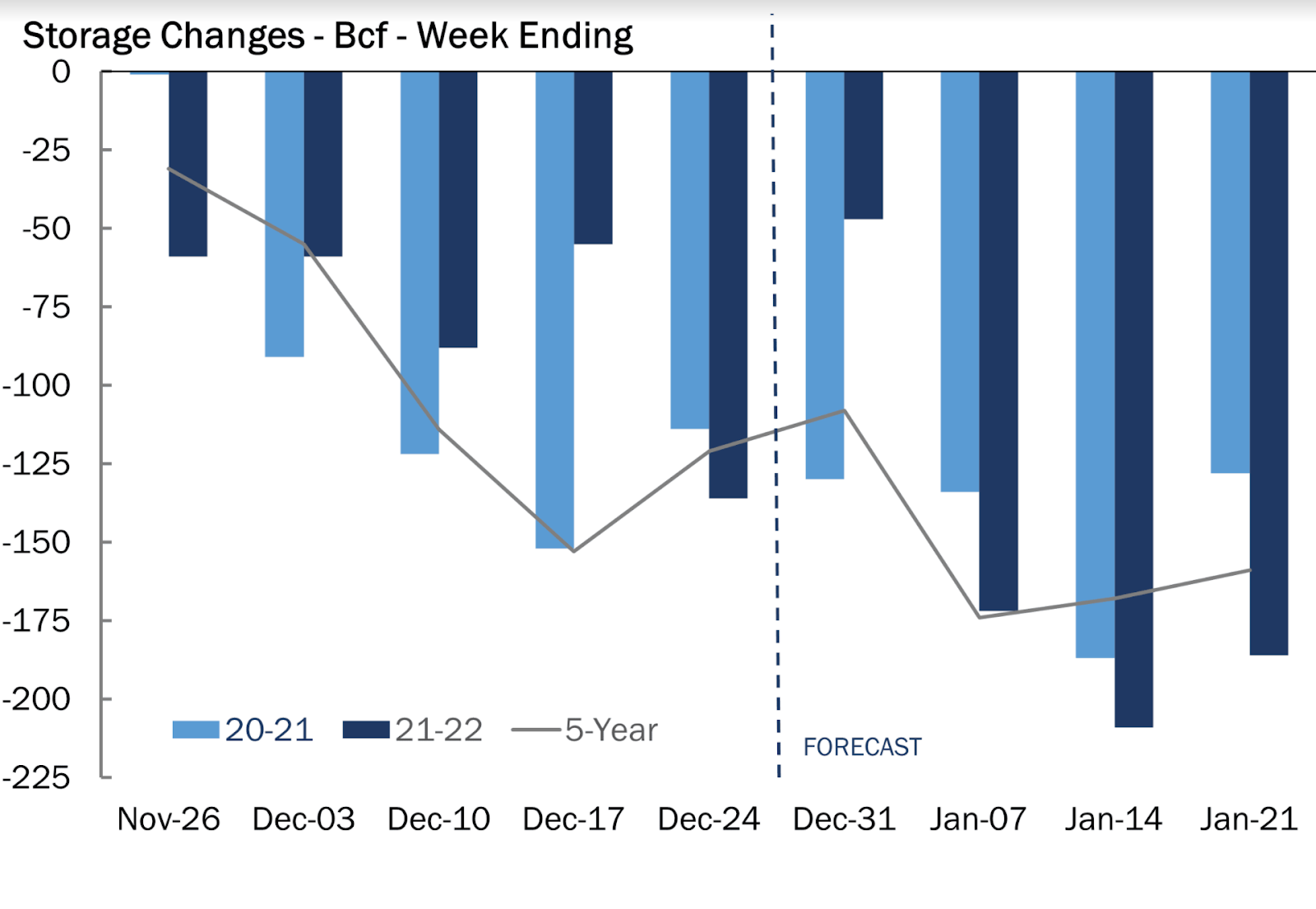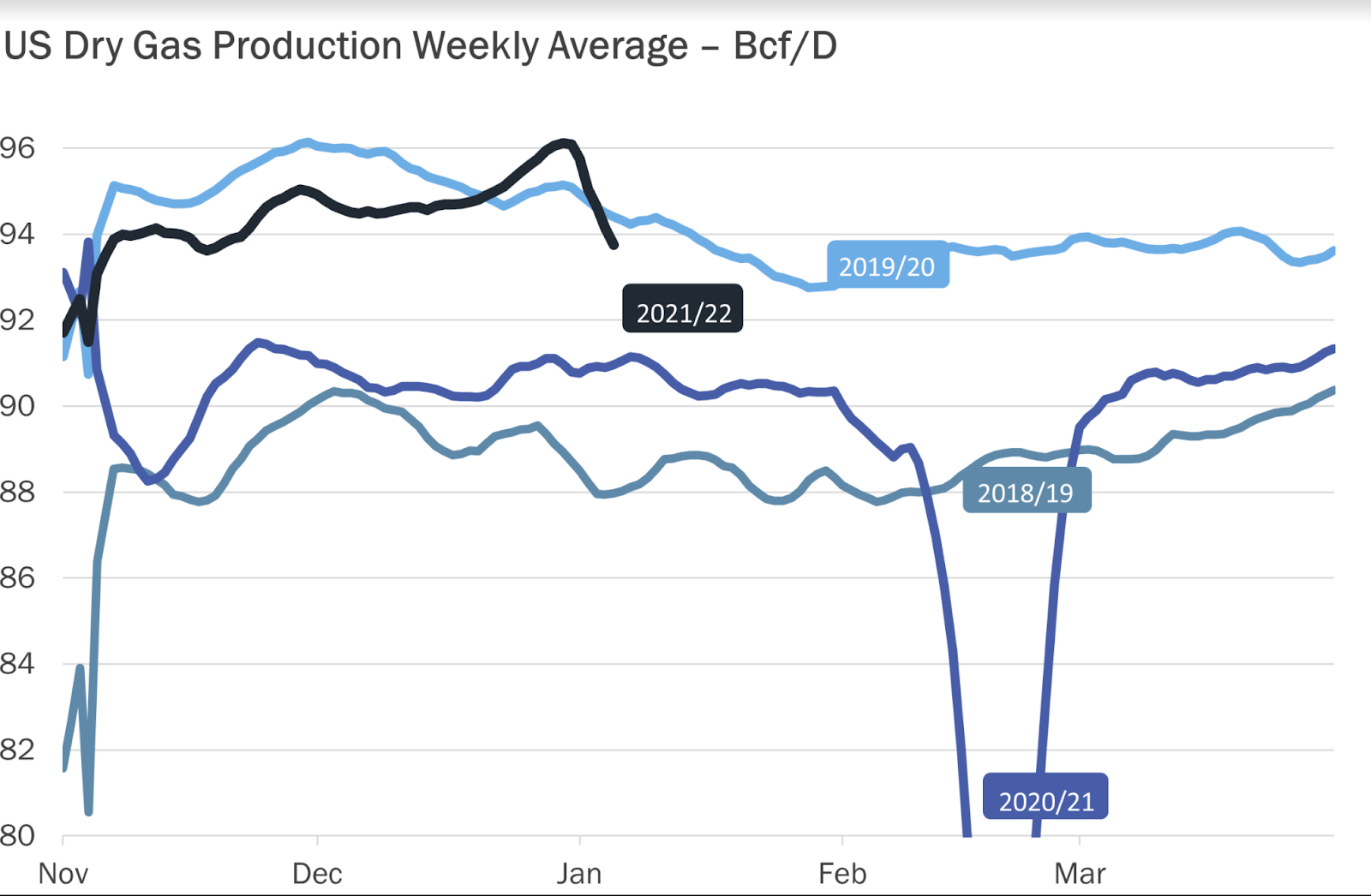Just after the triple-digit storage draw in the pre-Christmas week, updated data on US natural gas is expected to show another round of underwhelming consumption as inconsistent weather again led to lower heating requirements. 
As gas traders brace for today's storage report for the week ended Dec. 31 from the Energy Information Administration, the consensus among analysts tracked by Investing.com is for a draw of 54 billion cubic feet (bcf), versus the 136 bcf seen in the previous week to Dec. 24.
A year ago, some 127 bcf was consumed in the final week of December while on a five-year (2016-2020) average, the draw was 108 bcf during the same week.
If analysts are on target, the withdrawal during the week ended Dec. 31 would cut inventories to 3.172 trillion cubic feet. But that would be still about 2.4% higher than the five-year average, although 5.3% lower than a year ago.
“This week’s storage report is expected to significantly underperform … as a result of milder weather during the last week of December,” Dan Myers, analyst at Houston-based gas market consultancy Gelber & Associates, said in an email to clients of the firm, shared with Investing.com.
He added:
“This storage report will capture not only the tail-end of Christmas but also the runup into the New Year’s holidays - days that have historically displayed lower natural gas demand.”

Source: Gelber & Associates
Positive temperature anomalies were experienced along the entire Eastern seaboard of the United States—where gas is the primary fuel for heating—leading to decreased demand for natural gas over the week, Myers said.
Data from Refinitiv showed the weather in the week to New Year’s eve milder than normal, with 131 heating degree days (HDDs), compared with a 30-year normal of 186 HDDs typical for the period.
HDDs, used to estimate demand to heat homes and businesses, measure the number of degrees a day's average temperature is below 65 degrees Fahrenheit (18 degrees Celsius).
Forecaster NatGasWeather said in a post on naturalgasintel.com that weather models “have been bouncing between colder and warmer trends all week.”
But after a respite this weekend, “another frigid cold shot will sweep across the Midwest and Northeast early next week” with more freezing overnight temperatures, the forecaster said.
The ups-and-downs in weather have led to commensurate swings in US natural gas prices since the start of the year.
The front-month gas contract on New York’s Henry Hub was down 1.9% by 1:55 AM ET on Thursday, ahead of the regular trading session. On Wednesday, it settled up 4.4% after falling 2.6% the prior session and rising 2.3% on the first trading day of 2020.
Another reason for the swing in gas prices: falling production of gas.

Source: Gelber & Associates
Since 2020 began, US gas production averages have retreated from 96 bcf per day levels to below 94 bcf.
The downward move has been observed across all primary natural gas-producing basins, with the Permian, Haynesville, and Appalachian basins all recording decreased flows.
Myers also touched on this in his commentary. “Initial reports indicate a number of reasons for the fallback - seasonal start-of-year production declines, plant shutdowns, and even freeze-offs have all been blamed for the current decrease,” he said.
He said multiple gas facilities—including those owned by Oxy, Targa, and DCP Midstream—experienced operational issues as colder temperatures swept over Texas last weekend.
That has partly helped Henry Hub prices to trade upwards of the $3.80 mark, versus December lows of $3.54, Myers added.
EBW AnalyticsGroup senior analyst Eli Rubin told naturalgasintel.com that cold temperatures and lower gas production resulting from freeze-offs could collectively result in greater US storage withdrawals in coming weeks.
“Subsequent declines into a renewed deficit by mid-January—and a storage deficit rebuilding to triple digits by the end of the month—may provide additional near-term fundamental price support,” Rubin said.
On the liquefied natural gas (LNG) front, demand was holding strong, naturalgasintel.com said, estimating feed gas volumes at above 12 bcf on Wednesday. Robust demand from Europe could also push those volumes to record levels above 13 bcf/d this winter, it added in a report.
Rystad Energy senior analyst Wei Xiong noted in the same report that European supplies remained precariously light, following extreme weather and prolonged bouts of high demand in 2021. Additionally, gas flows from Russia to the continent this winter have been substantially lighter than expected amid political strife and regulatory pushback in Germany against the new Nord Stream 2 (NS2) pipeline.
Russia’s NS2 is completed but not yet delivering gas to Europe. The tensions with Russia create “the potential for continued weak flows from Russia into Western Europe through much of 2022,” and could further boost US LNG demand and Henry Hub prices, Xiong added.
Disclaimer: Barani Krishnan uses a range of views outside his own to bring diversity to his analysis of any market. For neutrality, he sometimes presents contrarian views and market variables. He does not hold a position in the commodities and securities he writes about.
